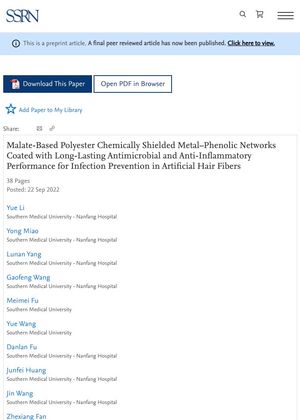Malate-Based Polyester Chemically Shielded Metal–Phenolic Networks Coated with Long-Lasting Antimicrobial and Anti-Inflammatory Performance for Infection Prevention in Artificial Hair Fibers
January 2022
in “
Social Science Research Network
”

TLDR A special coating was made for artificial hair fibers that can slowly release silver ions for up to 56 days, providing long-term protection against bacteria and inflammation.
The study aimed to reduce and anchor silver nanoparticles (AgNPs) on polyamide surfaces pre-deposited with a tannic acid coating. The researchers used plant-derived tannic acid to reduce silver ions, creating tannin-silver (TA-Ag) metal–phenolic networks (MPNs) deposited on polyamide layer-by-layer. The remaining functionalities on the immobilized TA moieties were subsequently covalently linked to poly(1,8-octanediol L-malate) (POM), a malate-based biodegradable polymer. This process effectively locked the AgNPs in the coating matrix, slowing down the "burst release" of AgNPs and extending the release time of silver ions up to 56 days. The resulting coating demonstrated long-term antibacterial (>97%) and anti-inflammatory properties, showing potential for widespread applications in artificial hair fibers and other medical implant applications.
